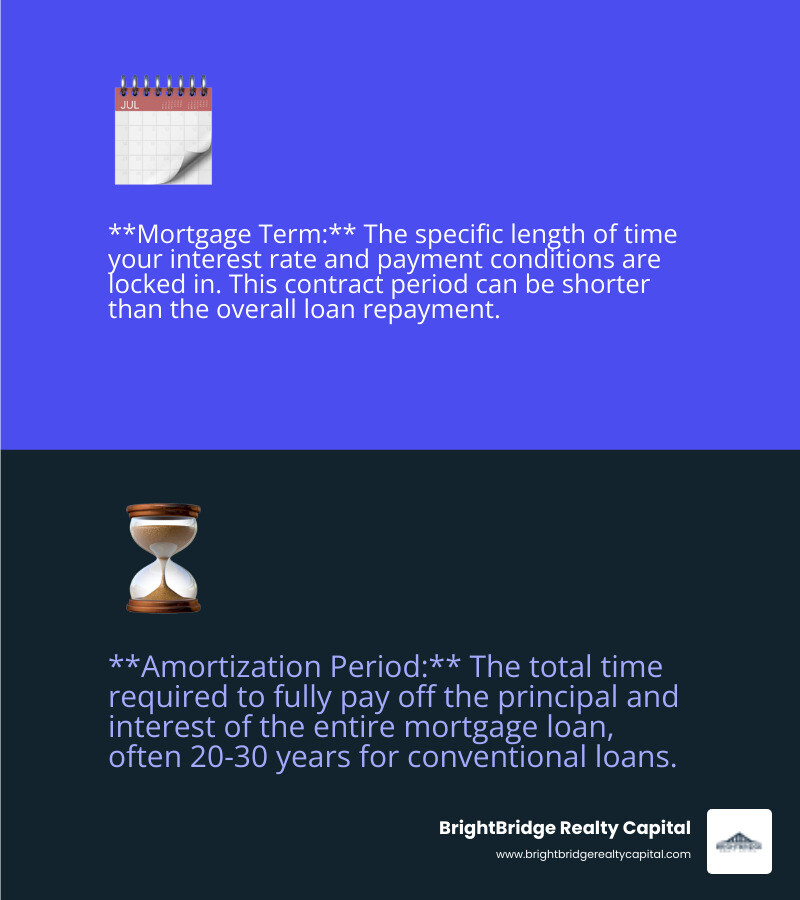Short-Term Mortgages Explained: Own Your Home Sooner

Understanding Short-Term Mortgage Loans
For individuals aiming to pay off their home faster or for investors looking to finance their projects more strategically, short term mortgage loans present a compelling path toward accelerated repayment and wealth creation. These financial instruments are fundamentally different from their long-term counterparts, designed for speed, efficiency, and significant long-term savings. Here’s a more detailed look at what they typically entail:
- Shorter Repayment Period: The most defining characteristic is the condensed timeline. Unlike the standard 30-year mortgage, which has become a benchmark in the U.S. housing market, short-term loans typically feature terms of 15, 10, or even 8 years. This accelerated schedule is designed to eliminate mortgage debt in a fraction of the time.
- Lower Interest Rates: Lenders view shorter loans as less risky. Their capital is tied up for a shorter duration, reducing their exposure to long-term economic uncertainties like inflation and interest rate fluctuations. This reduced risk is often passed on to the borrower in the form of a lower annual percentage rate (APR), which can lead to substantial savings.
- Higher Monthly Payments: The trade-off for a shorter term and lower rate is a higher monthly payment. The loan principal must be paid back over fewer years, meaning each payment is larger. This requires a stable, predictable income and disciplined budgeting.
- Faster Equity Building: Equity is the portion of your home's value that you own outright. With a short-term loan, a much larger percentage of each monthly payment goes toward reducing the principal balance rather than servicing interest. This allows you to build equity at a dramatically faster rate, increasing your net worth and providing financial leverage for future investments.
- Significant Interest Savings: This is perhaps the most powerful benefit. By paying the loan off quickly and at a lower interest rate, you can save tens, or even hundreds, of thousands of dollars in total interest payments over the life of the loan. This saved money can be redirected toward retirement, education, or other wealth-building opportunities.
Owning a home outright is a cornerstone of financial freedom, and the mortgage you choose is a critical decision that will reverberate through your financial life for years. To make an informed choice, understand the distinction between the mortgage term and the amortization period. The term is the length of your contract with the lender at a specific interest rate, which can be as short as one year. The amortization period is the total time it will take to pay off the loan. In many short term mortgage loans, like a 15-year fixed-rate mortgage, the term and amortization period are the same. However, in other products, like a 5-year balloon mortgage, the term is short, but the payments might be calculated over a 30-year amortization, requiring a large lump-sum payment at the end of the term.
As Greg Clement, Founder and CEO of Realeflow, aptly puts it, "A short-term mortgage isn’t just a loan – it’s a strategic financial maneuver designed to sprint towards homeownership. It demands more from your monthly budget but rewards you with financial freedom much sooner than you ever thought possible."
This strategic approach is particularly relevant for real estate investors. As Daniel Lopez, a loan officer at BrightBridge Realty Capital, I've structured countless short term mortgage loans for clients who need to move quickly in competitive markets. Whether it's a bridge loan to acquire a new property before an old one sells or a fix-and-flip loan to fund a renovation, these tools are indispensable for achieving ambitious investment goals on tight timelines.

Common short term mortgage loans vocab:
What Is a Short-Term Mortgage and How Does It Work?
A short term mortgage loan is primarily defined by its mortgage term—the duration of the contract you have with a lender that dictates your interest rate and payment structure. This is a crucial distinction from the amortization period, which is the total time calculated to pay off the entire loan principal and interest. While a standard 30-year mortgage has a term and amortization period of 30 years, many short-term products have a much shorter contractual term, often requiring renewal or refinancing.
A shorter term fundamentally alters the loan's dynamics. A larger portion of each monthly payment is allocated to the principal balance, not just the interest. This aggressive principal reduction means you build equity in your property much more quickly, which is a powerful wealth-building mechanism. This equity can serve as collateral for other loans, be tapped into via a home equity line of credit (HELOC), or simply represent a larger nest egg for your future.
One of the most attractive features of short term mortgage loans is the potential for lower interest rates. Lenders face less risk when their money is returned faster. There's a reduced risk of default, less exposure to long-term inflation eroding the value of their returns, and less uncertainty about future interest rate hikes. This lower risk profile often translates into better rates for qualified borrowers, making the loan cheaper on a percentage basis.
However, this structure necessitates higher monthly payments. Compressing a large loan into a shorter timeframe means each installment must be significantly larger to cover both the accelerated principal repayment and the interest. This requires meticulous financial planning and a stable income to ensure the payments remain manageable without causing financial distress.
Defining "Short-Term"
The definition of "short-term" can be fluid and depends on the context—whether for a homeowner or an investor. In the U.S. residential market, it typically refers to a loan with a term of 15 years or less. Popular options include 15-year, 10-year, and even 8-year fixed-rate mortgages. When compared to the 30-year fixed-rate mortgage—the marathon of home financing—these options are financial sprints.
For real estate investors, "short-term" can mean something much briefer. Loans like bridge loans or fix-and-flip loans can have terms as short as 6 to 24 months. These are designed for specific, rapid-turnaround strategies where the property is not intended to be held for a long period. Other products, like Adjustable-Rate Mortgages (ARMs) with a 5- or 7-year fixed period, can also function as short-term financing if the borrower plans to sell or refinance before the rate adjusts.
The Mechanics of a Shorter Loan
The power of a shorter loan term is best understood through its effect on the amortization schedule. This schedule details how each payment is broken down into principal and interest over the loan's life. With a short term mortgage loan, the principal balance shrinks at a much faster rate, creating a profound financial impact.

Consider a $400,000 loan. On a 30-year term at 7%, the first payment of approximately $2,661 would allocate around $2,333 to interest and only $328 to principal. In contrast, on a 15-year term at 6.5%, the first payment of about $3,483 would allocate roughly $2,167 to interest and a much larger $1,316 to principal. You're paying down the loan four times faster from day one.
This rapid principal reduction is the engine behind the two biggest benefits: achieving full ownership sooner and massive interest savings. Because interest is calculated on the outstanding balance, reducing that balance quickly means less interest accrues over time. This can save you hundreds of thousands of dollars that would have otherwise gone to the lender. Furthermore, this accelerated principal repayment means you build meaningful equity at a much quicker pace. For existing homeowners, this rapid equity growth can be a catalyst to refinance from a 30-year to a 15-year term, dramatically cutting their overall interest costs and fast-tracking their journey to becoming debt-free.
Short-Term vs. Long-Term Mortgages: A Detailed Comparison
Choosing between a short-term and a long-term mortgage is one of the most impactful financial decisions a homebuyer or investor will make. The right choice depends on your financial stability, risk tolerance, and long-term goals. Let's conduct a detailed comparison using a clear example to illuminate the profound differences.
Imagine you're taking out a $300,000 loan. A lender might offer you a 30-year term at a 7.0% interest rate or a 10-year term at a 6.5% interest rate. Here’s how the numbers break down:
| Feature | 10-Year Mortgage (Short-Term) | 30-Year Mortgage (Long-Term) |
|---|---|---|
| Interest Rate | 6.5% | 7.0% |
| Monthly Payment | $3,406.44 | $1,995.91 |
| Total Interest Paid | $108,772.72 | $418,527.58 |
| Total Cost | $408,772.72 | $718,527.58 |
This table reveals the stark trade-offs between the two loan structures.
Monthly Payments: The most immediate and noticeable difference is the monthly payment. The 10-year mortgage demands a payment that is over $1,400 higher each month. This requires a significantly larger and more stable income and a tighter monthly budget. The 30-year loan offers a much lower, more manageable payment, freeing up cash flow for other expenses, investments, or savings.
Total Interest Cost: Herein lies the biggest advantage of short term mortgage loans. In our example, the 10-year mortgage saves an astonishing $309,754.86 in interest. This is money that stays in your pocket, available to be invested in the stock market, used for retirement, or to fund other life goals. The lower payment of the long-term mortgage comes at the steep price of paying more than the original loan amount in interest alone.
Equity Growth: With a faster payoff schedule, your home equity grows much more rapidly. After five years on the 10-year loan, you would have paid down approximately $145,000 of your principal, building substantial equity. On the 30-year loan, you would have only paid down about $35,000 in principal over the same period. This faster equity accumulation provides a significant financial safety net and increases your net worth at an accelerated pace.
Financial Flexibility: Long-term mortgages are the clear winner in terms of flexibility. The lower monthly payments provide crucial breathing room in your budget. If you face an unexpected job loss, medical emergency, or other financial hardship, a lower mortgage payment is far easier to manage. A short-term loan, with its high payment, offers very little wiggle room and requires more financial discipline and a robust emergency fund.
Interest Rate Risk: This is a nuanced factor. A long-term fixed-rate mortgage locks in your interest rate for 30 years, providing absolute security against future rate hikes. This is a significant advantage in a rising-rate environment. However, with very short-term loans (e.g., a 3- or 5-year term), you face renewal risk. If market rates have risen when your term is up, you could be forced to renew at a much higher rate, causing a payment shock. Conversely, if you anticipate rates will fall, a short-term loan allows you to refinance sooner to take advantage of the better environment.
Opportunity Cost: With a long-term loan, the lower payment allows you to invest the difference elsewhere. A financially savvy individual might argue that they can earn a higher return in the stock market than the interest rate on their mortgage, making it logical to keep the mortgage for as long as possible. This strategy, known as arbitrage, requires discipline and risk tolerance. A short-term loan forces you to 'invest' in your home by paying down debt, which is a guaranteed, risk-free return equal to your interest rate.
The Pros and Cons of Short Term Mortgage Loans
Opting for a short term mortgage loan is a powerful financial strategy, but it's not without its challenges. It's essential to conduct a thorough and honest assessment of your financial situation, risk tolerance, and long-term goals before committing. Let's dig deeper into the specific advantages and disadvantages.

Key Benefits of a Shorter Term
Short term mortgage loans offer a suite of compelling benefits for the right borrower:
- Massive Interest Savings: This is the primary financial incentive. By shortening the loan's life, you drastically reduce the time over which interest can accrue. Combined with the typically lower interest rates offered on these loans, the savings can be monumental. Saving over $100,000 in interest is common when choosing a 15-year over a 30-year mortgage, freeing up immense capital for wealth creation.
- Accelerated Path to Homeownership: Owning your home outright is a significant milestone that provides profound financial and psychological security. A short-term mortgage can turn this dream into a reality in 10 or 15 years, rather than 30. This frees up hundreds or thousands of dollars in monthly cash flow that can be redirected to retirement savings, travel, or other passions.
- Rapid Equity Building: Because a larger portion of each payment attacks the principal balance, your equity—your stake in the property—grows much faster. This not only increases your net worth but also provides a valuable financial tool. High equity can serve as collateral for other loans or be accessed through a cash-out refinance for home improvements or investment opportunities.
- Financial Discipline and Security: Committing to a higher payment instills a sense of financial discipline. It forces you to prioritize your housing debt and live within your means. The reward is immense: eliminating your largest monthly expense provides unparalleled financial security and peace of mind, especially heading into retirement.
- More Favorable Interest Rates: As mentioned, lenders perceive less risk in shorter loans. This lower risk is often rewarded with a lower interest rate, sometimes by as much as 0.5% to 1.0% compared to a 30-year loan. This rate discount further amplifies your total interest savings.
Potential Drawbacks and Risks
It's crucial to be realistic about the challenges and potential pitfalls associated with short term mortgage loans:
- Significantly Higher Monthly Payments: This is the most significant hurdle. The compressed repayment schedule results in a substantially higher monthly obligation. Your income must be high and stable enough to comfortably support these payments without becoming "house poor"—a state where the vast majority of your income is consumed by housing costs, leaving little for savings or discretionary spending.
- Reduced Financial Flexibility and Liquidity: The high monthly payment ties up a large portion of your cash flow. This reduces your ability to handle unexpected financial shocks, such as a job loss, a medical emergency, or a major home repair. It also limits the amount of money you can allocate to other investments, like maxing out your 401(k) or investing in the stock market.
- Lower Borrowing Capacity: Lenders use your debt-to-income (DTI) ratio to determine how much you can borrow. Because a short-term loan has a higher monthly payment, it will result in a higher DTI ratio. This can reduce your maximum borrowing capacity, potentially limiting the price range of homes you can consider or even preventing you from qualifying for a loan at all.
- Renewal and Refinancing Risk: This is particularly relevant for very short-term loans (e.g., 2-5 year terms or balloon mortgages). When the term expires, you must either pay off the remaining balance or refinance. If interest rates have risen significantly, or if your financial situation has deteriorated (e.g., lower income or credit score), you may face a much higher payment or struggle to qualify for a new loan altogether.
- Stricter Qualification Criteria: Because of the higher payments and associated risks, lenders often impose stricter eligibility requirements for short-term loans. They will scrutinize your income stability, credit history, and cash reserves more closely to ensure you have the financial fortitude to manage the loan successfully.
Who Is a Short-Term Mortgage Best For?
Short term mortgage loans are a specialized financial tool, not a one-size-fits-all solution. They are ideally suited for specific borrower profiles who possess the financial stability and strategic goals to leverage their benefits effectively. Let's explore the ideal candidates for these powerful loans.
- Financially Stable Individuals and High-Income Earners: The most obvious candidates are those with a high, stable, and predictable income. Professionals like doctors, lawyers, or established business owners who have significant disposable income can comfortably manage the higher monthly payments without compromising their lifestyle or other financial goals. They should also have a robust emergency fund (typically 6-12 months of expenses) to mitigate the risk of an unexpected income disruption.
- Homeowners with Existing Equity (Refinancers): A very common and effective strategy is for existing homeowners, who have been paying down a 30-year mortgage for several years, to refinance into a 15-year loan. They have already built up equity, and their income has likely increased since they first bought the home. This allows them to accelerate their payoff date and save a fortune in interest without a dramatic increase in their monthly payment.
- Real Estate Investors: For professional investors, especially in markets like New York, NY, short term mortgage loans are not just an option—they are a necessity. These loans provide the speed and flexibility required for strategies like house flipping, bridging financing gaps between transactions (bridge loans), or quickly acquiring undervalued properties. The ability to secure funding and close in days, not months, is a massive competitive advantage.
- Borrowers Nearing Retirement: Individuals in their late 40s or 50s often prioritize entering retirement debt-free. A short-term loan, such as a 10- or 15-year mortgage, can align the mortgage payoff date with their planned retirement date. As financial planner Eric Croak notes, eliminating the mortgage payment before transitioning to a fixed retirement income is a cornerstone of a secure retirement plan, provided the higher payments are manageable during their peak earning years.
Eligibility and Qualification Requirements
Securing a short term mortgage loan requires demonstrating to the lender that you are a low-risk borrower capable of handling the liftd financial commitment. Lenders will conduct a rigorous underwriting process, focusing on these key areas:
- Strong Credit Score and History: A high credit score (typically 720 or above) is crucial. It signals to lenders that you have a proven history of managing debt responsibly. A higher score will not only increase your chances of approval but also help you secure the most competitive interest rates, maximizing your savings.
- Low Debt-to-Income (DTI) Ratio: Lenders will calculate two DTI ratios. The front-end ratio (your proposed monthly housing payment divided by your gross monthly income) should ideally be under 28%. The back-end ratio (all your monthly debt payments, including the mortgage, divided by your gross monthly income) should generally be under 36-43%, depending on the lender. For a high-payment short-term loan, lenders will want to see these ratios on the lower end of the scale.
- Stable and Verifiable Income: You will need to provide comprehensive proof of stable income through recent pay stubs, W-2s for the past two years, and federal tax returns. Self-employed borrowers will face even greater scrutiny and may need to provide two years of business tax returns and a profit-and-loss statement.
- Substantial Down Payment and Assets: A larger down payment (20% or more is ideal to avoid private mortgage insurance) reduces the lender's risk. Lenders will also want to see evidence of significant liquid assets and cash reserves (known as PITI reserves). They may require you to have enough cash on hand to cover 6 to 12 months of your mortgage payment (Principal, Interest, Taxes, and Insurance) after closing.
Exploring Different Types of Short-Term Loans
The landscape of short term mortgage loans is diverse, with products custom for both traditional homeowners and sophisticated real estate investors.

Short-Term Loans for Homeowners
- 15-Year and 10-Year Fixed-Rate Mortgages: These are the gold standard for homeowners wanting to pay off their homes quickly. They offer the stability of a fixed payment and rate, combined with massive interest savings.
- Adjustable-Rate Mortgages (ARMs): An ARM like a 5/1, 7/1, or 10/1 ARM offers a low, fixed introductory rate for the first 5, 7, or 10 years, after which the rate adjusts annually. These can be a strategic choice if you plan to sell or refinance before the adjustment period begins, allowing you to enjoy a lower payment in the short term.
- Refinancing: This isn't a loan type itself, but a strategy. Homeowners can refinance their existing mortgage into any of the above loan types to shorten their term and accelerate their payoff.
Specialized Loans for Real Estate Investors
For investors, speed and flexibility are paramount. At BrightBridge Realty Capital, we specialize in these custom solutions:
- Bridge Loans: These are short-term loans (typically 6-12 months) that "bridge" a gap in financing. For example, they allow an investor to purchase a new property using the equity in their existing property before it has been sold. They are essential for acting quickly in competitive markets.
- Fix-and-Flip Loans: Custom for investors who buy, renovate, and sell properties within a short timeframe (usually 12-18 months). These loans often cover both the purchase price and the renovation budget and may feature interest-only payments to keep carrying costs low during the project. More info about fix-and-flip loans.
- Hard Money Loans: These are asset-backed loans from private lenders or funds. Approval is based primarily on the value of the property (the "hard" asset) rather than the borrower's credit. They offer incredibly fast funding (sometimes in under a week) but come with higher interest rates and fees (points). They are ideal for experienced investors who need to close a deal immediately.
- Ground-Up Construction Loans: These loans finance the entire construction process, from land acquisition to building costs. They are disbursed in draws as construction milestones are met. Upon completion, they are typically refinanced into a long-term mortgage. More info about ground-up construction loans.
- DSCR Loans: Debt Service Coverage Ratio (DSCR) loans are a game-changer for investors. Qualification is based on the property's cash flow, not the borrower's personal income. The lender calculates the DSCR (Net Operating Income / Total Debt Service). As long as the ratio is above a certain threshold (e.g., 1.25x), the loan is approved. This allows investors to scale their portfolio without being limited by personal DTI ratios. More info about DSCR loans.
Frequently Asked Questions about Short-Term Mortgages
Navigating mortgages can be complex. To provide further clarity, here are detailed answers to some of the most common inquiries we receive about short term mortgage loans.
Why would I choose a short-term mortgage if the payments are so much higher?
The decision hinges on a trade-off between short-term cash flow and long-term wealth. The primary motivation is twofold: massive interest savings and a dramatically accelerated path to debt-free homeownership. A shorter term can easily save you over $100,000 in interest compared to a 30-year loan. That saved interest is a guaranteed, risk-free return on your money. Furthermore, owning your home free and clear 15 or 20 years sooner provides immense financial security and frees up thousands of dollars in monthly cash flow that can be used to boost your retirement savings, invest elsewhere, or simply enjoy life with fewer financial burdens.
Can I refinance my current 30-year mortgage into a short-term loan?
Absolutely. Refinancing from a long-term to a short term mortgage loan is a very common and powerful financial strategy. This is often ideal for homeowners who have been in their homes for several years, have seen their income increase, and have built up some equity. The key considerations are:
- Affordability: You must be certain that your current and future income can comfortably support the new, higher monthly payment.
- Closing Costs: Refinancing involves closing costs, typically 2-5% of the loan amount. You need to calculate your "break-even point"—the point at which your monthly savings from the lower interest rate have covered the closing costs. You should plan to stay in the home long enough to make it worthwhile.
- Interest Rate: The move makes the most sense when you can secure a significantly lower interest rate than your current one, amplifying your savings.
Are short-term mortgages only for buying a primary residence?
Not at all. While 10- and 15-year fixed-rate mortgages are popular choices for homeowners, short term mortgage loans is incredibly important for real estate investors. In fact, many investment strategies would be impossible without them. Investors use specialized short-term products like bridge loans to acquire new properties quickly, fix-and-flip loans to fund renovations, and hard money loans when speed is more critical than cost. At BrightBridge Realty Capital, we specialize in providing this type of fast, flexible funding that investors need to capitalize on opportunities in competitive markets like New York, NY.
What happens if I can't make the higher payments on my short-term mortgage?
This is a critical risk to consider. If you face financial hardship, such as a job loss or unexpected major expense, the high payment of a short-term loan can become unmanageable quickly. You have several options, though none are ideal. You could attempt to refinance back into a longer-term loan (e.g., a 30-year mortgage) to lower your monthly payment, but you would need to qualify and pay closing costs. You could also speak to your lender about a loan modification or a temporary forbearance plan. In a worst-case scenario, you might be forced to sell the property. This is why having a substantial emergency fund (6-12 months of payments) is non-negotiable before taking on a short-term mortgage.
Do short-term mortgages have prepayment penalties?
For standard conforming loans for primary residences, such as 10- or 15-year fixed-rate mortgages, prepayment penalties are now very rare in the United States due to consumer protection regulations. You can typically make extra payments or pay off the loan entirely without a fee. However, for non-qualified mortgages (Non-QM) and many investor-focused loans, such as hard money loans, DSCR loans, or fix-and-flip loans, prepayment penalties are quite common. They are used to ensure the lender earns a certain amount of interest for taking on the risk. It's crucial to read the loan documents carefully and understand if a prepayment penalty exists and how it is calculated.
Conclusion: Is a Short-Term Mortgage Right for You?
Choosing a mortgage is a defining moment in your financial life. A short term mortgage loan represents a powerful, albeit demanding, path toward financial freedom. These loans are designed for those who want to break free from debt quickly, offering the incredible rewards of less total interest paid, faster homeownership, and rapid equity accumulation. Committing to a 10- or 15-year term is a pledge to your future self, promising a life with fewer financial burdens years ahead of schedule.
However, this accelerated path requires a clear-eyed assessment of the challenges. The significantly higher monthly payments demand a stable, high income and unwavering budget discipline. This type of loan is not suitable for everyone and can induce significant financial stress if your income is volatile or your budget is already stretched thin. An honest financial check-up is the essential first step. You must ensure that the higher payments are not just possible, but comfortable.
For the disciplined homeowner, a short-term loan is a direct route to faster debt-free living and accelerated wealth growth. For the savvy real estate investor, specialized short-term financing from direct lenders like BrightBridge Realty Capital is the key to open uping opportunities, providing the speed and flexibility needed to thrive in the competitive investment world.
Final Questions to Ask Yourself
Before you commit, ask yourself these critical questions:
- Is my income stable and secure? Do I anticipate my income growing or remaining steady for the duration of the loan?
- Do I have a substantial emergency fund? Have I saved at least 6-12 months of living expenses to cover unexpected financial shocks?
- How does this fit my long-term goals? Does paying off my house quickly align with my retirement plans and other investment strategies?
- Can I handle the reduced cash flow? Am I willing to sacrifice some discretionary spending and liquidity in exchange for long-term interest savings?
- Have I explored all my options? Have I compared the costs and benefits of a 15-year loan versus making extra payments on a 30-year loan?
If you can answer these questions with confidence, a short-term mortgage might be the most effective financial decision you ever make. Ready to take the next step in your real estate journey? Find out how we can help you achieve your goals with speed and confidence by exploring our rental loan programs.


